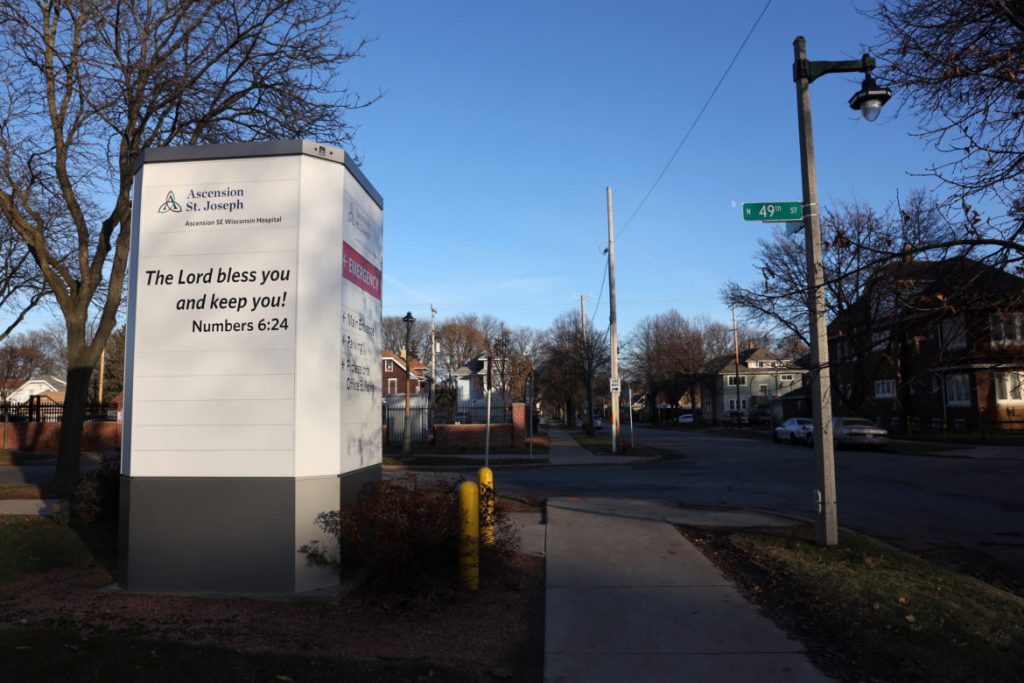Catholic Hospitals Dominate State, Restrict Women’s Choices
Hospitals restrict reproductive procedures, contraception — more than in nearly any state.
The revolution overturning abortion is being led by Catholics.
It’s not just that the five justices voting to overturn Roe v. Wade — Samuel Alito, Amy Coney Barrett, Neil Gorsuch, Brett Kavanaugh and Clarence Thomas — are Catholic, with a sixth member who is Catholic, Chief Justice John Roberts, balking at overturning Roe but voting to uphold the Mississippi abortion restrictions in the Dobbs case.
In short, even before Roe was overturned, it had gotten progressively harder to get an abortion or other reproductive procedures in Wisconsin Few patients understand this, partly because they don’t expect rules by an archbishop to trump medical science in hospitals, but also because Catholic hospitals are not very transparent about this.
As big health care systems merge, this has reduced the number of smaller health care systems and increased the domination by Catholic systems: Four of the nation’s 10 largest health systems are now Catholic, according to a 2020 report on the growth of Catholic health systems by the consumer advocacy group Community Catalyst.
One in every six acute care hospital beds (16.8%) is now in a Catholic facility, up from one in seven in 2001, the report found. “The number of Catholic-owned or affiliated short-term acute care hospitals grew by 28.5 percent over the last two decades, even as the number of non-Catholic hospitals declined by 13.6 percent,” it found.
“The 10 largest Catholic health systems have grown and strengthened through mergers and acquisitions, and now control significantly more short-term acute care hospitals than they did two decades ago. These 10 systems own or control 394 short-term acute care hospitals, a 50 percent increase since 2001.”
Compared to three of the top health care systems in the U.S., which are for-profit entities, the report notes, Catholic health systems “are not-for-profit entities, which gives them a financial advantage over the for-profit systems, as they are exempt from local and state property taxes, as well as state and federal income tax.”
In short, taxpayers are helping subsidize hospitals that refuse to provide what are standard treatments in other hospitals. “The Catholic health-care facilities follow directives from the United States Conference of Catholic Bishops that prohibit treatment it deems ‘immoral’: sterilization including as well as abortion. Those policies can limit treatment options for obstetric care during miscarriages and ectopic pregnancies, particularly in the presence of a fetal heartbeat,” a story by the Washington Post noted.
Community Catalyst found that Alaska has the highest percent of acute care hospital beds that are in Catholic facilities, at 46%. Second was Washington (41%), with Wisconsin, South Dakota and Iowa tied for third at 40%.
Why does Wisconsin rank so high? One reason is that it ranks 10th among the states in the portion of residents (29%) who are Catholics and thus has more Catholic hospitals. And there is more freedom for those hospitals to merge and buy out non-religious hospitals because “Wisconsin is one of 15 states that does not have a process for controlling hospital expansions or mergers, often called a Certificate of Need,” as a story by Wisconsin Watch noted.
Ascension, the fourth largest health care system in the country, is the major Catholic system in Wisconsin. Nationally, “it has grown from 36 short-term acute care hospitals in 2001 to 80 hospitals in 2020 through a continuous string of acquisitions,” Community Catalyst found. “The system operates at more than 2,600 sites in 20 states and the District of Columbia with 229 total hospitals, 170 urgent care centers and 50 senior living facilities.”
In those hospitals, “Catholic ethics can trump medical best practice, bishops can wield more influence than physicians, and patients can be denied care they desire or need,” the story noted.
“At one Catholic hospital in Milwaukee, physicians ‘constantly’ run into these restrictions while providing care to their patients,” one obstetrician told the publication. “The doctor said some Catholic-prohibited procedures, such as tying a woman’s tubes after she delivers via C-section to prevent additional pregnancies, are so frequently requested that doctors have lost track of how many times they have had to deny them.”
According to a 2021 study published in Contraception, “About 1-in-12 women in Wisconsin rural counties served by Catholic sole community hospitals reported… being turned away from a Catholic healthcare setting without receiving desired reproductive care.”
Catholic hospitals and clinics often refuse to prescribe birth control pills or provide IUDs. “Ascension’s St. Joseph Hospital, for example, billed for an IUD just nine times for the fiscal year ending June 2019, whereas the non-Catholic Froedtert Memorial Lutheran Hospital, less than 5 miles away, did the same more than 1,500 times,” Wisconsin Watch found.
Patients are often surprised when they are refused a medical treatment, the Post story noted. A 2018 national survey asked adult women of reproductive age where they go for their reproductive care; 16% named a Catholic hospital. However, over one-third of them did not know that their hospital was Catholic.
The refusal to do procedures such as tubal ligation often results in women who wanted to prevent another pregnancy getting pregnant again. One study found that nearly half of women who requested to be sterilized but were denied became pregnant within a year.
And that leads to more deaths for women. “Researchers have found that women were about 14 times more likely to die during or after giving birth to a live baby than to die from complications of an abortion,” Reuters reported.
The impact falls particularly hard on Black women in Wisconsin, because 52% of Black women in this state deliver their child in a Catholic hospital, the highest percentage in the nation, according to a study by Columbia Law School researchers.
As Community Catalyst noted, “Catholic hospitals and health systems receive nearly $48 billion of taxpayer dollars each year, in the form of Medicare and Medicaid reimbursements,” even as they refuse to provide medical treatments needed by women. The growth of Catholic health systems is making it more difficult to get abortions even in blue states where abortion is legal. It is also making it more difficult for women to get vital, often life-changing reproductive care. And all this is being subsidized, through tax exemptions for Catholic hospitals, and underwritten, through Medicare and Medicaid payments to those hospitals, by the taxpayers.
Murphy's Law
-
The Last Paycheck of Don Smiley
 Dec 17th, 2025 by Bruce Murphy
Dec 17th, 2025 by Bruce Murphy
-
Top Health Care Exec Paid $25.7 Million
 Dec 16th, 2025 by Bruce Murphy
Dec 16th, 2025 by Bruce Murphy
-
Milwaukee Mayor’s Power in Decline?
 Dec 10th, 2025 by Bruce Murphy
Dec 10th, 2025 by Bruce Murphy






















